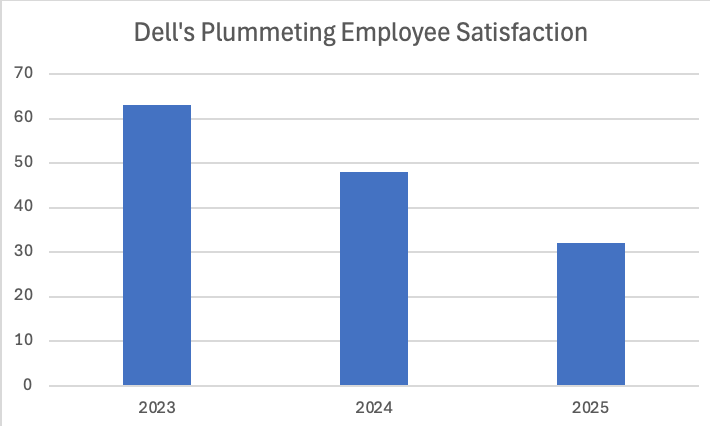Dell, Inc. conducts an annual employee survey and this year’s results are out. Or more accurately, outed. Dell doesn’t release the info publicly, but someone sent a video transcript to Business Insider who reported on the story.
The scores aren’t pretty. Here’s the composite over the last three years:

That trendline goes to 0 in 2027.
My first reaction was…”oh yeah, Dell. I’d forgotten they exist.” Do people still buy Dell computers?
But my second was to look at the reasons for discontent, and notice how common they are.
The report lists these factors:
RTO (return to office): Dell is forcing people to be back in the office full time. I seem to recall companies in 2020 and 2021 saying “we’re so grateful that our flexible, agile employees pivoted to work from home, and it’s allowed us to maintain a high level of productivity, etc.” Then as soon as the pandemic faded, it was “get back in here.” People hate RTO.
And it’s not because they’re home eating Bon-Bons, watching Judge Judy, and playing Xbox. If you don’t trust your people to work when they’re supposed to, that’s a leadership problem, not an employee problem. You either hired the wrong people or don’t have meaningful metrics that allow you to understand the impact of their work and note discrepancies.
TYhe talk about “co-located teamwork” and such is nonsense anyway. Most teams, particularly in the tech space, are in multiple locations and collaborating over Teams or similar. The days when everyone got together in a single conference room are ancient history. I’ve worked with people all over the world for the last ten years in my day job and we would gain nothing by being in the same building.
Indeed, we’d lose a lot. Requiring people take two hours a day to drive back and forth to a building is time that they’d largely spend working. Saying we only hire in a particular city would impoverish our recruiting pipeline and force us to miss out on a lot of great people.
The reality is that the world has moved on from in-office work, yet management is still stuck in the dark ages.
AI: There’s two kinds of AI layoffs: the kind where AI directly replaces your job (relatively rare), and the kind where the company spends so much chasing AI that they have to cut elsewhere. I haven’t heard of any great AI breakthroughs at Dell, so I’m guessing it’s the latter.
Which is another way of saying that management is distracted by the latest shiny thing. In this case, without much to show for it: Dell stock is nearly exactly flat over the last year. The reality is that management has no clue how AI is going to impact their business or what to do with it, but it’s important so…do something!
Layoffs: Followup to AI. Nothing sucks the life out of an organization like constantly being afraid of getting the chop. The way corporate America does layoffs has evolved to the present soulless assembly line method: managers huddle and make a list, HR sets a surprise appointment, and separation is instant. And extremely disruptive in people’s lives – being laid off is more impactful to most people than even a serious illness.
Layoffs are often obviously capricious and not set rationally. Sure, if you’ve got a product and no one is buying it any more, laying off the team that is responsible for producing that product makes sense. But often there’s little rhyme or reason. Layoffs are principally done to appease shareholders (“we’re doing something!”) and there is no small amount of academic research that shows they rarely accomplish the intended goal.
The Problem with Employee Surveys
“Tell Dell” is “confidential” but not “anonymous”. In other words, who in their right mind would put how they really feel on a survey? All too easy for management to track down the malcontents. Better to play it safe and say nothing. Or, if responses are tracked and you’re hounded that you haven’t completed yours yet, give a high rating and leave no comments.
Anything else risks impacting your job and your life. How much can your comments really matter? If management doesn’t know what problems exist, how clueless are they anyway? What if everyone lists poor compensation as their primary complaint? I heard from an HR friend once that this happened in a large company and management decided to “exclude certain non-actionables” from reporting. They felt they couldn’t do anything about compensation, so if it was mentioned, it was simply stricken from the tally.
I think there’s some value in truly anonymous surveys because people can comment without fear. But management in large organizations doesn’t seem to like them. Instead, they say things like “we have an open culture in which people can speak out without fear of reprisal”. The problem is that it’s very hard to convince people of that, especially when layoffs loom.
Dell’s Troubled Future
I never understood why Michael Dell came back, other than his ego. Dell operates in one of the worst sectors of IT: commodity PCs and hardware. It’s incredibly difficult if not impossible to differentiate yourself in that space.
Even worse, the long-term trendline is towards cloud computing, and hyperscalers don’t need Dell. Big Tech builds their own because they have the scale to be their own mini-Dells. That leaves Dell fighting with a lot of other players for small- and medium-sized businesses, who are highly price-sensitive and require a lot of hand-holding.
Dell at one point owned VmWare. I have to think they wake up every day and regret that sale. It did help pay down a lot of their EMC acquisition debt, but which would your rather own? A storage vendor – talk about commodity – or the virtualization king? Sure, VmWare has gone to hell in a handbasket thanks to Broadcom, but Dell could have done something different with it.
Dell is not a leader in cloud. It’s not a leader in AI. It’s not a leader in anything, really. It’s an also-ran in the most commoditized parts of the market.
Since the business is going nowhere and under pressure, this gloom rolls down on employees, who reflect it in their Tell Dell surveys. The reality – how employees really feel – is much worse since Tell Dell is not anonymized.
Blind is not kind:
- “Very dysfunctional in terms of restructuring, layoffs, and direction from leadership”
- “No opportunities growth for business on the horizon. So cutting costs is the only way for the company to improve income”
- “Leadership lacks vision and has been aggressively focusing on downsizing. Deliver more with less seems to be the theme with constant reorganizations.”
- “Severe pay compression — many high performers stuck years below fair market comp and level. • Stretch culture without promotion: You’ll be asked to operate 2–3 levels above your role, then told to “network more” to get recognized. • Performance and loyalty often punished with burnout, not reward. • Leadership talks a lot about “transformation,” but frontline execution is powered by underpaid, overlooked staff. • HR and middle management are largely powerless — decisions require VP+ sponsorship you’ll never get access to as they wont take the added risk of advocating for others. • Reorgs, layoffs, and vague culture campaigns instead of solving the root problems.”
And those are just within the last month.






















Leave a Reply